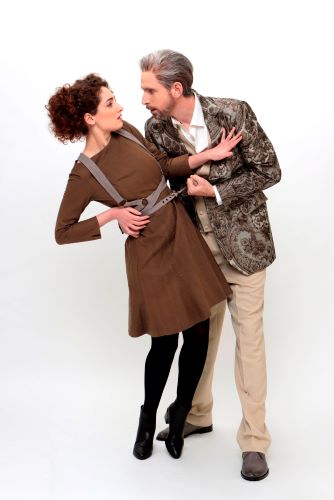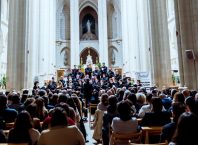Le nozze di Figaro, one of the most beloved and most performed operas worldwide, will be coming to the Israeli Opera this March, in a new production directed by Sir David Pountney, and conducted by Michele Gamba. Composed by Wolfgang Amadeus Mozart in 1786, with a libretto by Lorenzo Da Ponte, the comic opera features some of the entertaining characters from Rossini’s The Barber of Seville; both operas are based on a trilogy of plays by French playwright Pierre Beaumarchais, that follow the adventures of the clever servant, Figaro. The opera features a creative team of international and Israeli talents, with set design by Leslie Travers, costumes by Ula Shevtsov, lighting design by Keren Granek, and movement design by Maté Moray. Le nozze di Figaro (The Marriage of Figaro) will be performed at the Israeli Opera from March 27 – April 9, 2022.

As the title indicates, Figaro, having assisted the Count Almaviva in courting his beloved Rosina, is now about to enjoy the fruits of wedded bliss with Susanna. However, the passing years have altered the Count; his wandering eyes linger on the lovely Susanna, and he intends to take advantage of droit du seigneur, the supposed right of lords to have sexual relations with their servants, particularly on the women’s wedding night. The Countess Rosina is not pleased with this turn of events, and neither are Figaro and Susanna. The three bridge the divide between the classes, working together to fool the Count and foil his plans. Naturally, it is not at all simple. Among the complications along the way is Marcellina’s claim that she lent Figaro money in the past in exchange for a promise to marry; she now wants him to either pay her back, or fulfill his promise. It’s an exciting day, full of secrets, scheming, disguises and mistaken identities.
This production marks the first time that Sir David Pountney has directed Le nozze di Figaro, and he shared his perspective on the opera:* It is one of the first operas set within a household, centered on the relationships within that household between husbands, wives, fiancées, lovers, teachers, lawyers, gardeners and others. This is a household with a distinct and rigid division between the aristocrats and their servants, as in the popular series Upstairs Downstairs. It is a division with a physical presence as well, the lords live upstairs, while their servants live downstairs, or in the attic. In addition to these two groups there exists a third, a middle class composed of professionals such as lawyers and teachers, who interact in their own way with the other two, serving the aristocracy, yet superior to the servants. The current production emphasizes this social divide with the stage split in two by a wall, on one side the aristocracy dwell in luxury, on the other side the servants live in poverty. Yet the servants have their own advantage in knowing all the secrets of their masters. Therefore, the separation between the two is not simple, and is traversed by relationships between the two groups. The political and emotional aim of the opera is to make peace, on a personal level between husbands and wives, and politically, between the classes. At the time, when Mozart composed the opera, this was a very incendiary subject, but these borders still exist in modern cultures, no matter how democratic they may appear to be on the surface. Any crisis, such as the recent pandemic, only emphasizes the gaps that still exists between different classes and races. However, to be honest, the opera is not a political lecture, but rather deep human psychological research. It doesn’t matter what class these people belong to and how distanced they are, they are all still people, viewed through the wise and empathetic gaze that characterizes Mozart’s genius.
Soloists in Le nozze di Figaro include: Theo Hoffman and Oded Reich alternating as Count Almaviva; Alla Vasilevitsky and Tal Bergman alternating as Countess Almaviva; Daniela Skorka and Shira Patshornik alternating as Susanna; Cody Quattlebaum and Ross Ramgobin alternating as Figaro; Anat Czarny and Tal Ganor alternating as Cherubino; Yuri Kissin as Bartolo; Shaked Strul and Noa Hope alternating as Marcellina; Eitan Drori and Ron Silberstein alternating as Don Basilio; Oshri Segev and Ron Silberstein alternating as Curzio; Veronika Brook and Tom Cohen alternating as Barbarina; Pnini Leon Gruber as Antonio; Efrat Raz and Ilona Toivis as Village maids. The opera will be sung in Italian with English and Hebrew surtitles.
There will be an introductory talk on the opera an hour before each performance, admission is free to ticket holders. Performance dates and times may be found on the Israeli Opera website: https://www.israel-opera.co.il/eng. Tickets may be purchased online, or call: 03-692777.
*Sir David Pountney’s comments on the production were provided in Hebrew by the opera’s public relations, the paraphrasing in English is mine.





